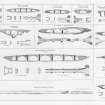Wick Bridge
Road Bridge(S) (Period Unassigned)
Site Name Wick Bridge
Classification Road Bridge(S) (Period Unassigned)
Alternative Name(s) Bridge Street; Bridge Of Wick; Wick, Telford Bridge; River Wick; Wick River
Canmore ID 9198
Site Number ND35SE 60
NGR ND 36234 50882
Datum OSGB36 - NGR
Permalink http://canmore.org.uk/site/9198
- Council Highland
- Parish Wick
- Former Region Highland
- Former District Caithness
- Former County Caithness
ND35SE 60 36234 50882
Not to be confused with Wick Harbour Bridge (ND 3650 509, for which see ND35SE 69.
Bridge of Wick [NAT]
OS 1:2500 map, 1972.
Architect Thomas Telford 1803-1821. Rebuilt 1877, copy of original bridge, Murdoch Paterson - engineer.
(Undated) information in NMRS.
(Location cited as ND 363 509). Wick Bridge, built 1877. A masonry bridge with three segmental arches, replacing an earlier Telford bridge of similar design.
J R Hume 1977.
Wick Bridge (ND 362 509) was built in 1877 by Murdoch Paterson with contractor Daniel Miller of Wick, retaining the size and outline of Telford's earlier bridge, and on the site of a bridge of 1665.
G Nelson 1990.
Bridge of Wick. Three segmental ashlar arches, by Murdoch Paterson, 1875-7.
J Gifford 1992.
This bridge carries the A9 public road (here known as Bridge Street) across the River Wick (Wick River) between Wick (to the N) and Pultneytown (to the S), within the town of Wick (ND35SE 81).
Information from RCAHMS (RJCM), 7 December 2000.
Modification (1776)
The 17th century wooden bridge refurbished in 1776 was described as 'with wooden planks upon 11 pillars'.
R Paxton and J Shipway, 2007.
Publication Account (2007)
Wick Bridge
In 1665 Wick had a wooden bridge supported on stone pillars which was described at its refurbishment in 1776 as ‘with wooden planks upon eleven pillars’. As the first step in the development of Pultneytown for the British Fisheries Society [founded 1786], Telford designed a three-arched masonry bridge about 15 ft wide between parapets which was built about 100 yards downstream of the old bridge by George Burn from 1806–09 at a cost of £2000 including a contribution from the Highland Roads and Bridges Commission. It had spans of 48 ft, 60 ft and 40 ft and a parapet line and stringer curved to an arc of a large radius similar to, but smaller than, Lovat Bridge (5-21).
This bridge was in turn replaced in 1877 by the present wider and flatter road bridge of three segmental arches with similar spans built by Murdoch Paterson, with Daniel Miller of Wick as the contractor.
R Paxton and J Shipway, 2007.
Reproduced from 'Civil Engineering heritage: Scotland - Highlands and Islands' with kind permission from Thomas Telford Publishers.




























